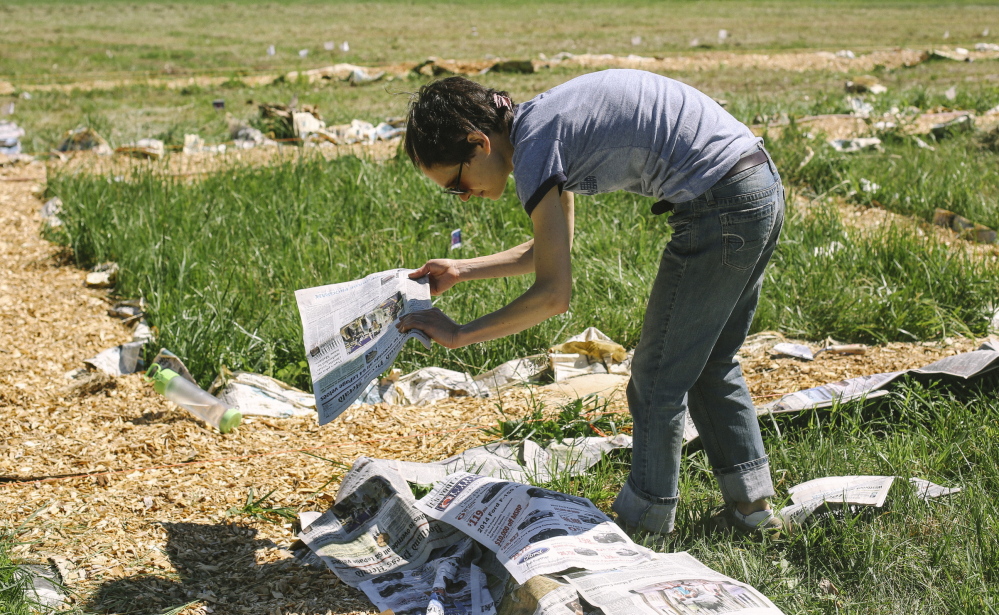Like any garden, the garden plots at Casco Bay Community Garden on the Eastern Promenade in Portland vary by the desires and experience of the gardeners. On a mid-July visit, I noticed some gardens packed with a profusion of plants and already producing cucumbers and summer squash, while others were just getting underway.
Casco Bay, named by the gardeners in part for its great views of the bay, is the newest of the nine community gardens that the nonprofit Cultivating Community manages for the city. The garden opened late last summer after a no-mow area was converted to rich soil through sheet mulching.
These new garden spaces – and the ones being created at a 10th garden in Libbytown – are in high demand, according to Laura Mailander, an urban agriculture specialist with Cultivating Community. About 200 people are on a waiting list for community plots. The city has 380 existing plots, many of which are tended by multiple families, Mailander said.
Gardeners I met spoke of harvests of kale, lettuce, spinach, beets and cucumbers, but added that the gardens have more going for them than vegetables. At Casco Bay, gardeners plant, water and weed with views of sailboats on blue waters. And a sense of community develops among the people gardening together, they said.
Until three years ago, the city managed most of the community gardens. Now, it contracts their management to Cultivating Community, a group that runs farms and gardening programs around the state.
The people who rent the plots come from the entire spectrum of the city’s population.
“One of our gardens in Kennedy Park, which was started by Cultivating Community and folded into the city gardens, is mostly new Americans, and a lot of them are low-income,” Mailander said. “There is a garden in Brentwood, near Evergreen Cemetery, that is mixed-income – everyone from the upper-class to lower-income. It really runs the gamut.”
It costs $50 a year to rent the standard plot, which measures 10 feet by 15 feet. Half-plots cost $35. Families who qualify as low-income pay only $15 per year. Generous-minded gardeners may pay more than the rental fee to support lower-income gardeners.
Since several of the gardens were built with Community Development Block Grants – designed partly to improve the health and nutrition of low-income families – those families get priority, Mailander said.
At the start of every season, the city brings in compost for the gardeners. It also provides tools, and has installed and maintains a 4-foot fence around most of the gardens.
All the gardens are organic. Each has a list of permitted treatments, and gardeners must ask before using anything that is not on the list. “It’s my philosophy that if you start with healthy soil, you will have healthy plants,” Mailander said. “And if you have healthy plants, you don’t need to use anything on them.”
Renters of plots range from rank beginners to experienced gardeners – education is integral to the Cultivating Community program. Mailander, who grew up on a farm in Colorado, teaches workshops and works with some gardeners directly.
Some gardeners who grow more vegetables than they can use donate the extra to programs like the Root Cellar and Harvest for the Hungry – which is part of what makes the city gardens a community.
ABOUT THE WRITER
TOM ATWELL is a freelance writer gardening in Cape Elizabeth. He can be contacted at 767-2297 or at: tomatwell@me.com.
Send questions/comments to the editors.



Success. Please wait for the page to reload. If the page does not reload within 5 seconds, please refresh the page.
Enter your email and password to access comments.
Hi, to comment on stories you must . This profile is in addition to your subscription and website login.
Already have a commenting profile? .
Invalid username/password.
Please check your email to confirm and complete your registration.
Only subscribers are eligible to post comments. Please subscribe or login first for digital access. Here’s why.
Use the form below to reset your password. When you've submitted your account email, we will send an email with a reset code.